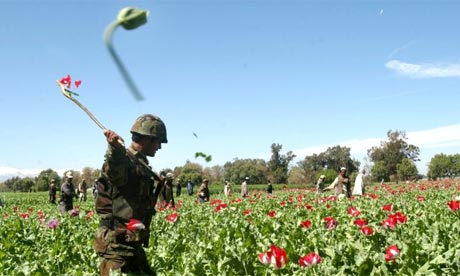Kainaat Mushtaq
SRINAGAR, July 27: Policemen armed with sickles, sticks and guns are swooping on the sprawling fields of North Kashmir, not in a hunt for militants, but to destroy fields of cannabis and opium poppy, the sources of hashish and heroin.
Kashmir is famous for growing apples, almonds, walnuts, saffron and rice but it is also known for growing cannabis and producing hashish. The climate of scenic valley, ringed by snow-covered Himalayan mountains, is suitable for poppy cannabis and cultivation.
Taking advantage of a fall in insurgency Jammu and Kashmir Police has destroyed thousands of acres of poppy and cannabis fields in Kashmir so far.
On Thursday police said they, along with a team of excise and revenue departments destroyed bung or poppy cultivation spread over 95 kanals (less than 5 hectares) of land at Hakabara in Bandipora, 55 kms north of capital Srinagar.
Policemen have been confronting angry farmers, desperate for cash, some of whom say they were not even aware they were breaking the law.
“Earlier, these areas were highly militant-infested and farmers took advantage of that and started cultivating poppy,” said a senior police officer.
“But as the situation has been improving we decided to eradicate poppy.”
Kashmir has witnessed sharp decline in violence that killed tens of thousands of people in past two decades.
‘Rich Dividends’
Police has also appealed for Muslim clerics to support the campaign and use their pulpits to denounce cannabis and poppy growing.
Government allows poppy cultivation under licence in very small pockets across country and under strict supervision for medicinal use.
But authorities say hundreds of farmers in Kashmir, especially the southern parts in the foothills of the densely forested Pir Panjal mountain range, started growing poppy and cannabis after militancy erupted in 1990.
“Farmers get 25 times more money from cannabis and poppy cultivation than from other crops and with little efforts,” said an excise department official, who did not want to be identified.
“Also, they need not bother about irrigation and pesticides.”
In May and June, farmers typically extract hundreds of tonnes of opium by “milking” the poppy pods, which drug cartels convert to heroin to sell in different cities.
Cannabis is harvested in autumn for hashish.
‘Growing Menace’
Acknowledging that many people were not aware of the law, police said they have refrained from making frequent arrests of poppy cultivators in the past. But they also did not pay compensation to farmers whose fields they destroyed.
But if cultivation goes unchecked Kashmir might soon become “notorious for the drug trade”, the officer warned.
According to officials the drug addiction in Kashmir, once an easy going society, has gone up drastically among youth since 1990. The Jammu and Kashmir police have set up a de-addiction centre to counter the growing menace.
Experts say unemployment, an unending and festering conflict or peer pressure are the reasons that more and more youth are taking to drugs.











